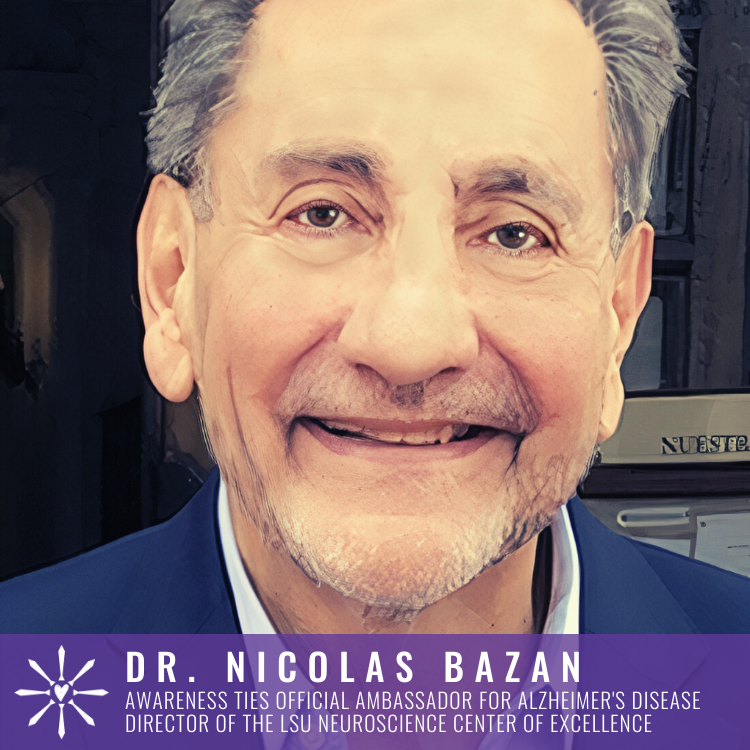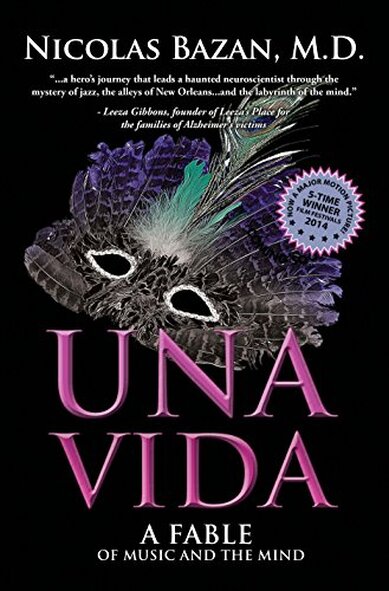When I was just eight years old, a critical life-altering event occurred that set me on this path to begin exploring and understanding the brain.
|
In my novel, Una Vida: A Fable of Music and the Mind, I describe an early experience through the fictional character, Dr. Alvaro Cruz:
“...at eight, the course of his life was set when he witnessed his aunt having a grand mal seizure. They were in Salta, on the way to his piano teacher’s house… His aunt began to convulse violently, then fell with a thud onto the muddy cobblestone street. Young Cruz watched in fascinated horror, as though from a great distance that grew greater each moment, as her body flailed like a chicken whose neck had just been wrung. Her feet were shaking as though someone were choking her; she was clawing for her life...there in the sweltering street, he somehow understood that the brain held all the power.” While Dr. Alvaro Cruz is fictional, this event was very real and led to my decision to go to medical school in Argentina in order to focus on the brain. Specifically, I wanted to understand why certain brains, such as my Aunt Tita’s, deviated from others and what I could do to help these patients. These riddles took over my curious mind, and I resolved to chart the maze of the brain and to find the key to unlocking the many mysteries held within this organ. My ongoing quest in biology and medicine is, in a way, a response to a major challenge facing civilization: the growing incidence in the loss of cognition in neurodegenerative diseases as increased life expectancy occurs. |
The Novel
|
“In a chance encounter on a New Orleans levee top, a respected neuroscientist crosses paths with an itinerant blues singer. The result of the meeting launches the doctor on a voyage of discovery about jazz, about his beloved New Orleans, about human relations, and mainly about his own search for understanding the horrible affliction of Alzheimer's disease which he had battled clinically for years. In his search he discovers that it is not enough to simply study the physical brain and it's attending neurons and synapses but also to recognize the beauty of the person for whom the brain functions.
Dr. Nicolas Bazan has written a novel that is wrapped within interests that he obviously knows and cares about deeply. In doing so we are not only given a well-told story, but an invitation to passionately embrace his favorite subjects through the thoughts, dreams and dialogue of his characters. Admittedly, at times we are not sure if we are listening to the musings and observations of his main character, Alvaro Cruz, or lectures in history, culture and medicine by Bazan himself. In either case we understand the goal that Cruz/Bazan has set for himself early on. In the ancient, childlike and bluesy Mazy Waters, Una Vida, we see the embodiment of all that the inquisitive Cruz must confront as cognition slowly saps essence from her being. Throughout we explore Cruz's efforts to piece together members of her family and her past, all in a race against the time left to the mind of the singer.” - Patrick M. Burke |
The Man
Nicolas G. Bazan, M.D., Ph.D., has been called “a true renaissance man”: research scientist, teacher, mentor, community leader, author, screenplay writer/executive movie producer, patron of the arts, and entrepreneur. Born in Los Sarmientos, Tucuman, Argentina, Dr. Bazan received his MD from the National University of Tucuman, Argentina, trained at Columbia University College of Physicians and Surgeons, NYC and Harvard Medical School. He was appointed faculty at age 26 at Clarke Institute of Psychiatry/University of Toronto.
He is the founding Director of the Neuroscience Center of Excellence, School of Medicine, LSU Health New Orleans, inaugural founder of The Ernest C. and Yvette C. Villere Chair for Research in Retinal Degeneration (1984-present), and has been appointed to the highest academic rank in the LSU System, a Boyd Professor (1994-present). He is also a Foreign Adjunct Professor of Neuroscience, Karolinska Institutet, Stockholm, Sweden.
His research is focused on understanding cellular and molecular mechanisms to prevent and cure Alzheimer’s Disease (AD), other neurodegenerative diseases as well as other neurological conditions. His research and contributions include stroke, traumatic brain damage, pain, epilepsy, brain tumors and age related macular degenerations. His research has led to the uncovering of new gene regulation and necessary proteins for cell survival in retinal pigment epithelial cells and brain cells. Most recently he began applying his knowledge and ideas to counteract consequences of the SARS-CoV2 viral infection that produces COVID-19.
He has discovered cellular and molecular principles that reveal novel pro-homeostatic mediators relevant to counteract onset, early stages and progression of neurodegenerative diseases. His original research is reflected in more than 480 peer-reviewed publications (PubMed), in addition to monographs, books, and chapters, an h-index of 97 (Google Scholar), an i10-index of 420, and greater than 37,945 citations to his work (Google Scholar as of 09/30/2020).
Dr. Bazan's honors and awards include the following:
Javits Neuroscience Investigator Award NINDS, NIH, 1989 • Citation Classic, “Neural Stimulation or Onset of Cerebral Ischemia Activates Phospholipase A2” Current Contents/Life Sciences, 30:10, July 29, 1991 • Elected Member, Royal Academy of Sciences, Spain, 1993 • Elected Member, Royal Academy of Medicine, Spain, 1996 • Fellow, Royal College of Physicians of Ireland, Dublin, 1999 • Doctor Honoris Causa, Universidad Nacional del Tucuman, Argentina, 1999 • Endre A. Balazs Prize, International Society of Eye Research, 2000 • Neurochem. Res. issue dedicated to Nicolas Bazan, Vol. 25, No. 5, 2000 • President, American Society for Neurochemistry, 1999-2001 • First Leon Wolfe Lecturer, Montreal Neurol. Inst., Canada, 2004 • Association for Research in Vision and Ophthalmology, Proctor Medal and Lecture, 2007 • Adv. in Exp. Med and Biol., Vol. 613, Recent Advances in Retinal Degeneration book dedicated to Nicolas Bazan, 2008 • Chevreul Medal, Paris, France, 2011 • Alkmeon International Prize, 2011 • Keynote Speaker and Excellence Award, European Association for Vision and Eye Research, 2013 • Medal, Miroslaw M. Mossakowski, Polish Academy of Sciences, 2013 • The Pan-American Association for Biochemistry and Molecular Biology Plenary Lecturer, Iguazu, Argentina, 2015 • Gradle Medal, The Pan-American Association of Ophthalmology/World Ophthalmology Congress, Guadalajara, Mexico, 2016 • Association for Research in Vision and Ophthalmology (ARVO) Foundation for Eye Research Gala Honoree, Honolulu, Hawaii, 2018 • Deutsches Zentrum für Neurodegenerative Erkrankungen (DZNE) in der Helmholtz-Gemeinschaft, Award 2018, Bonn, Germany • McGill University’s Mark Nickerson Memorial Lecture, Montreal, Quebec, Canada - May 9, 2019 • Click here to view Dr. Bazan's Bibliography in the National Library of Medicine.
He was also named Inventor of Novel Synthetic Potential Therapeutic Compounds, holding over 100 patents and provisional patents. Currently, he is beginning to apply his discoveries (patents exclusively licensed from the University in three startup companies that he co-founded). They are NeuResto Therapeutics, LLC (novel discoveries for Alzheimer’s, Parkinson’s, retinal degenerations, stroke, traumatic brain injury, and other brain and retina diseases) and South Rampart Pharma, LLC (novel non-addictive, non-toxic painkiller) and CurVirBiotech, LLC (novel preventive and therapeutics against viral infections, particularly SARS-CoV-2 that causes COVID-19).
He is the founding Director of the Neuroscience Center of Excellence, School of Medicine, LSU Health New Orleans, inaugural founder of The Ernest C. and Yvette C. Villere Chair for Research in Retinal Degeneration (1984-present), and has been appointed to the highest academic rank in the LSU System, a Boyd Professor (1994-present). He is also a Foreign Adjunct Professor of Neuroscience, Karolinska Institutet, Stockholm, Sweden.
His research is focused on understanding cellular and molecular mechanisms to prevent and cure Alzheimer’s Disease (AD), other neurodegenerative diseases as well as other neurological conditions. His research and contributions include stroke, traumatic brain damage, pain, epilepsy, brain tumors and age related macular degenerations. His research has led to the uncovering of new gene regulation and necessary proteins for cell survival in retinal pigment epithelial cells and brain cells. Most recently he began applying his knowledge and ideas to counteract consequences of the SARS-CoV2 viral infection that produces COVID-19.
He has discovered cellular and molecular principles that reveal novel pro-homeostatic mediators relevant to counteract onset, early stages and progression of neurodegenerative diseases. His original research is reflected in more than 480 peer-reviewed publications (PubMed), in addition to monographs, books, and chapters, an h-index of 97 (Google Scholar), an i10-index of 420, and greater than 37,945 citations to his work (Google Scholar as of 09/30/2020).
Dr. Bazan's honors and awards include the following:
Javits Neuroscience Investigator Award NINDS, NIH, 1989 • Citation Classic, “Neural Stimulation or Onset of Cerebral Ischemia Activates Phospholipase A2” Current Contents/Life Sciences, 30:10, July 29, 1991 • Elected Member, Royal Academy of Sciences, Spain, 1993 • Elected Member, Royal Academy of Medicine, Spain, 1996 • Fellow, Royal College of Physicians of Ireland, Dublin, 1999 • Doctor Honoris Causa, Universidad Nacional del Tucuman, Argentina, 1999 • Endre A. Balazs Prize, International Society of Eye Research, 2000 • Neurochem. Res. issue dedicated to Nicolas Bazan, Vol. 25, No. 5, 2000 • President, American Society for Neurochemistry, 1999-2001 • First Leon Wolfe Lecturer, Montreal Neurol. Inst., Canada, 2004 • Association for Research in Vision and Ophthalmology, Proctor Medal and Lecture, 2007 • Adv. in Exp. Med and Biol., Vol. 613, Recent Advances in Retinal Degeneration book dedicated to Nicolas Bazan, 2008 • Chevreul Medal, Paris, France, 2011 • Alkmeon International Prize, 2011 • Keynote Speaker and Excellence Award, European Association for Vision and Eye Research, 2013 • Medal, Miroslaw M. Mossakowski, Polish Academy of Sciences, 2013 • The Pan-American Association for Biochemistry and Molecular Biology Plenary Lecturer, Iguazu, Argentina, 2015 • Gradle Medal, The Pan-American Association of Ophthalmology/World Ophthalmology Congress, Guadalajara, Mexico, 2016 • Association for Research in Vision and Ophthalmology (ARVO) Foundation for Eye Research Gala Honoree, Honolulu, Hawaii, 2018 • Deutsches Zentrum für Neurodegenerative Erkrankungen (DZNE) in der Helmholtz-Gemeinschaft, Award 2018, Bonn, Germany • McGill University’s Mark Nickerson Memorial Lecture, Montreal, Quebec, Canada - May 9, 2019 • Click here to view Dr. Bazan's Bibliography in the National Library of Medicine.
He was also named Inventor of Novel Synthetic Potential Therapeutic Compounds, holding over 100 patents and provisional patents. Currently, he is beginning to apply his discoveries (patents exclusively licensed from the University in three startup companies that he co-founded). They are NeuResto Therapeutics, LLC (novel discoveries for Alzheimer’s, Parkinson’s, retinal degenerations, stroke, traumatic brain injury, and other brain and retina diseases) and South Rampart Pharma, LLC (novel non-addictive, non-toxic painkiller) and CurVirBiotech, LLC (novel preventive and therapeutics against viral infections, particularly SARS-CoV-2 that causes COVID-19).





